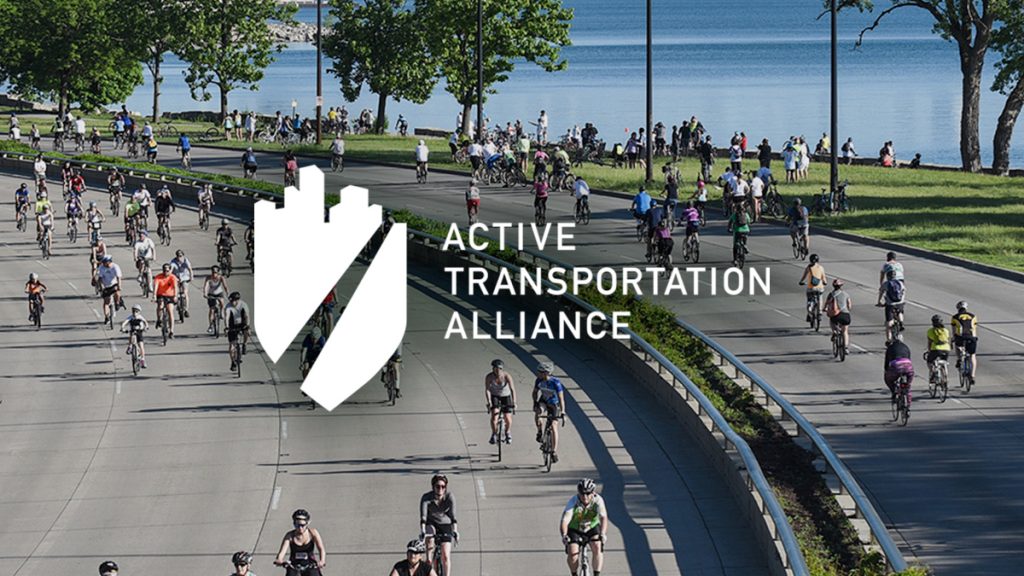For release: June 11, 2014
Contact:
Ted Villaire
Communications Director
Active Transportation Alliance
312.427.3325 x288
312.563.1118 mobile
[email protected]
Civic group to help suburbs develop next generation bike facilities
Survey reveals people want protection from car traffic
Chicago, Ill., June 11, 2014 — The Active Transportation Alliance today announced a new project that will help suburban communities in the Chicago region develop low-stress bikeways that are comfortable and safe places for people of all ages and abilities to ride. Active Trans calls these facilities “Family-Friendly Bikeways,” which include:
·
Trails that can be used for trips to school, work and other destinations as well as recreation.
·
On-street protected bike lanes that use parked cars, posts and curbs to separate bikes and car traffic.
·
“Bike Boulevards” on quiet residential streets that give priority to people biking and discourage cut-through motor-vehicle traffic.
In launching the project, Active Trans points to a recent Illinois Department of Transportation survey which found the public wants bikeways that provide protection and separation from cars.
“Studies find that less than 10 percent of the population feels comfortable biking in traffic on a typical street or bike lane,” said Ron Burke, Active Transportation Alliance executive director. “Family-friendly bikeways are low-stress facilities for the other 90 percent. Our goals is creating bike routes where you’d feel comfortable biking with your young child.”
The Chicago region has added hundreds of miles of important bike facilities over the past 30 years, and Active Trans has been a part of that progress by advocating for bike funding and helping communities develop bike plans. Unfortunately, most of the on-street facilities are traditional three-foot-wide striped bike lanes and “share the road” markings. These facilities work fine for the strong and confident 10 percent, but they don’t sufficiently remove the element of fear for others to ride more than occasionally. In addition, trails in the region are often difficult to access by bike and serve primarily recreational biking trips. Despite the considerable advances made in the Chicago region to advance bicycling, including hundreds of miles of bike infrastructure, concerns about safety still loom large.
The need for next-generation bike facilities that minimize interactions with car traffic is heightened by a significant increase in the number of cars on our streets. Between 1982 and 2012, the number of motor vehicles registered in Illinois increased by 3 million (42 percent increase) and vehicle miles traveled increased 65 billion miles per year, a 63 percent increase.
“All the additional car traffic has kept many people away from biking,” said Burke. “Biking is a fun and healthy way to get around, and it’s important to provide routes that people of all ages and abilities will use.”
Burke added: “Biking on most streets is actually quite safe when you bike responsibly, but for inexperienced people, cycling on a typical street feels like learning to ski on a black diamond slope.”
Since 2011, Active Trans has been working closely with the city of Chicago to develop next generation bike facilities, and Chicago is now a national leader. Progress in Chicago and other places is spreading to the suburbs. For example, Evanston is currently building its third protected bike lane, the Illinois Prairie Path through Wheaton serves as both a recreational destination and transportation corridor, and Blue Island recently declared its intention to move “toward a family-friendly bikeways system” in a mayoral proclamation.
Active Trans is offering to help suburbs with public outreach and planning to develop networks of Family Friendly Bikeways and to advocate for state and federal funding so suburbs can pay for the new facilities.
The public is urged to sign a petition supporting Family Friendly Bikeways in their community at www.activetrans.org/ffb.
For more information, suburban officials in the North and West Chicago Suburbs should contact Nancy Wagner at [email protected], and officials in South and Southwest Chicagoland and Northwest Indiana should contact Leslie Phemister at [email protected].
The Active Transportation Alliance is a non-profit, member-based advocacy organization that works to make bicycling, walking and public transit so safe, convenient and fun that we will achieve a significant shift from environmentally harmful, sedentary travel to clean, active travel. The organization builds a movement around active transportation, encourages physical activity, increases safety and builds a world-class transportation network. Formerly the Chicagoland Bicycle Federation, the Active Transportation Alliance is supported by more than 7,000 members, 1,000 volunteers and 35 full-time staff. For more information about the Active Transportation Alliance, visit www.activetrans.org or call 312.427.3325.

